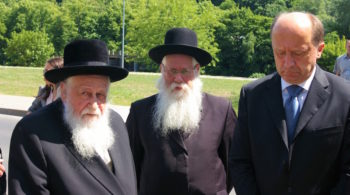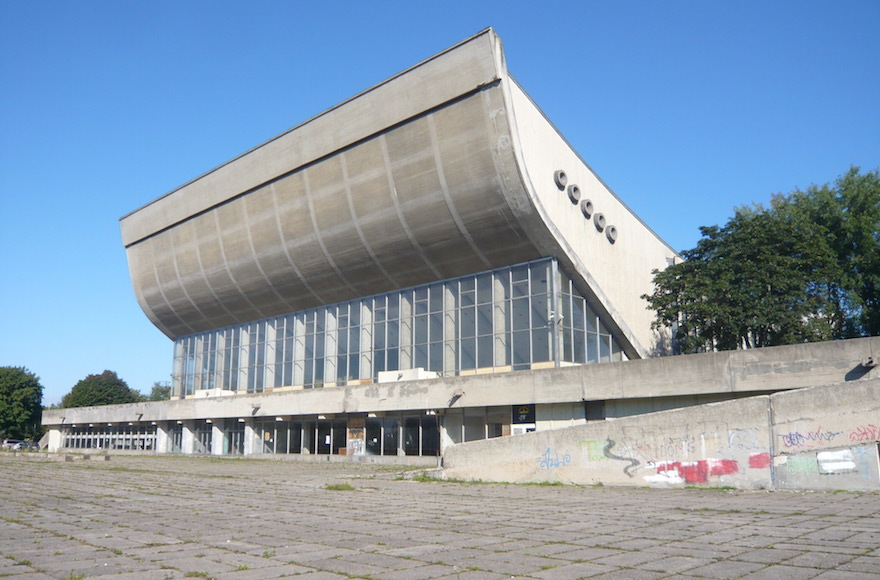VILNIUS, Lithuania (JTA) – It’s one of the most intriguing sites in all of Vilnius: a massive Soviet-style sports complex built in 1971 that since its closure in 2004 has become a run-down haven for vagrants.
Now the Lithuanian government has some grand plans to renovate the rotting behemoth and turn it into a gleaming $25 million conference center.
Just one thing stands in the way: a few dead Jews.
The site along the Neris River in the Snipiskes district is considered one of the most valuable unused tracts of land in Lithuania’s rapidly gentrifying capital city. But it also sits atop the remnants of Vilnius’ oldest Jewish cemetery, Piramont, which houses the remains of countless Jewish luminaries from the city’s past. The legendary 18th-century sage known as the Gaon of Vilna originally was buried there, though his remains were moved in 1949. (The Soviets allowed local Jews to move only seven bodies from Piramont before they destroyed the graveyard.)
“Imagine that the Piramont cemetery is the cemetery where the kings, priests, sages of your nation are buried,” said Ruta Bloshtein, a member of the Jewish Community of Vilnius. Building there would be “absolute barbarism.”
In a quirk of fate, the Lithuanian government – a frequent target for criticism on Holocaust-related issues – has sought Jewish approval to go ahead with the renovation plan because a $14.5 million subsidy from the European Union may depend on it. France and Germany have laws about protecting Jewish cemeteries, and last month a senior European Commission official, Alice Richard, wrote in a letter that if Lithuania were to use EU funds for the center, “this would have to be done in line with relevant EU and national laws” and “involve all stakeholders (including NGOs and local communities).”
Many local Jews oppose the planned construction; Jewish law forbids disturbing human remains. But when a group of rabbis from the London-based Committee for the Preservation of Jewish Cemeteries in Europe was flown in to assess the project, they gave it the thumbs-up in a meeting in April with Lithuanian Prime Minister Algirdas Butkevicius that was given prime-time news coverage.
The reasoning of the committee, recognized as an expert body by the European Parliament, was that although the cemetery was located on the site, the proposed renovation would not disturb Jewish remains because remains may not even be present at the precise location of the planned construction.
“There is not even a cause for concern about the desecration of a cemetery,” said Rabbi Avraham Ginsberg, the committee’s executive director. “There is absolutely nothing there.”
Lithuania’s official Jewish community leadership then followed suit and endorsed the government’s renovation plan for the hulking sports complex.
“It is a very massive building. It was dug very deep into the ground,” community president Faina Kukliansky said. “Therefore, there can’t be remains there.”
Under the current plan, the area around the building would be preserved as a memorial park with plaques commemorating the prominent people buried there, according to Kukliansky.
But some local Jews accuse both their leaders and the London-based rabbinic committee of corruption, charging that their decisions were the result of payoffs.
They cite as evidence a 2009 cable sent by a U.S. State Department official and leaked by WikiLeaks that reported that the London-based committee was seeking $100,000 for “rabbinical supervision of digging,” to be obtained by the Lithuanian government from developers. The money was requested for supervision of exploratory digging and beautification of the Piramont compound conducted that year.

Rabbi Shaye Schlesinger left, chairman of the Committee for the Preservation the Jewish Cemeteries in Europe, with former Lithuanian Prime Minister Andrius Kubilius, right, at a ceremony in Vilnius in June 2011. (Courtesy of the Committee for the Preservation the Jewish Cemeteries in Europe)
These locals and foreigners “clearly entered into a conspiracy of traitors to obliterate the memory of the old cemetery of Vilnius, its sanctity, integrity and all its territory,” Rabbi Shmuel Yakov Feffer, a scholar and descendant of the Vilna Gaon, wrote in an open letter he posted in June on Defendinghistory.com. He went on to warn against “local interests and foreign organizations, including a Jewish committee which visits with its people, hurriedly conducting compromises and various tradeoffs.”
Dovid Katz, a Vilnius-based scholar of Yiddish who is campaigning against the planned construction, said the committee’s demand for funds “damages their credibility” and that, in any case, “Litvak rabbis should decide, not Londoners.”
But Ginsberg said the $100,000 was an estimate of the maximum amount of expenses that his organization would need to spend on the project, and that in the end the committee received only a few thousand dollars from the Lithuanian government.
“It was for an onsite supervisor, a ground-penetrating radar survey and travel expenses,” he said. “The opposition interpreted this as a bribe, which is utter nonsense.”
If not for the London committee’s intervention at Piramont, “the whole cemetery would have been leveled,” Ginsberg said.
After the country’s chief rabbi of 11 years, Chaim Burshtein, openly criticized the planned construction, he was fired last month. Kukliansky, the community president, declined to answer JTA’s questions about the dismissal, saying she had nothing to do with it. But she was quoted by the Baltic News Service as saying that Burshtein had “spread entirely misleading information about the Snipiskes cemetery.”
The fight over the Vilnius cemetery is among the more notable disputes surrounding the dilemma over how to deal with the crumbling Jewish graveyards of Eastern Europe.
Jewish cemeteries all over the region are threatened – often by neglect, but also by real estate development. In Slovakia, the country’s small Jewish community can afford to care for and monitor only one-fifth of the country’s 750 cemeteries, which are easy targets for land grabs and abuse by contractors. In Poland, only 7 percent of 1,400 Jewish cemeteries are fenced, inviting garbage dumping and other mischief.
In 2012, the Council of Europe adopted a nonbinding resolution placing responsibility for the care of Jewish cemeteries on national governments. The resolution was based on a report that noted instances of Eastern European cemeteries that have been turned into “residential areas, public gardens, leisure parks, army grounds and storage sites.”
As for the Piramont cemetery, Andrew Baker, the director of international affairs for the American Jewish Committee and the man who led negotiations with Lithuania’s government over restitution for Jewish property lost in the Holocaust, said the government’s handling of this particular issue has been praiseworthy.
“The diligence and the level of care with which the Lithuanian government is proceeding on this issue is worthy of praise as exemplary,” Baker said, adding that he was “not aware of any conclusive evidence that the proposed project would desecrate or disturb Jewish graves.”
For its part, the government in Vilnius seems unfazed by the protest and is determined to carry out the renovation project.
“We wish to reassure you that no works will be undertaken without the knowledge of or consent by you or the Jewish Community of Lithuania,” Lithuania’s undersecretary for education, Rimantas Vaitkus, wrote last month to the London-based rabbinic committee, “so that the future congress center may operate while ensuring proper respect for the sanctity of the cemetery.”
JTA has documented Jewish history in real-time for over a century. Keep our journalism strong by joining us in supporting independent, award-winning reporting.






